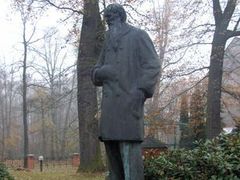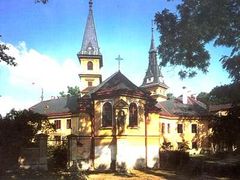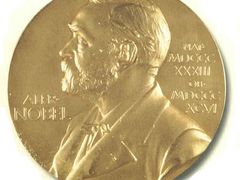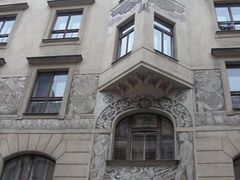Prague - He lived a life that would make a perfect Hollywood movie: it wasn´t short of unbelievably quick rises and destiny strikes, strong will and eventually also a fabulous happy ending. And yet, these days most people don´t know him at all. Although he could be rightly described as the Czech Alfred Nobel.
His name was Josef Hlávka.
This year his foundation, which until now has been supporting gifted students, scientists and artists, will commemorate Josef Hlávka together with the Academy of Sciences with a special series of concerts, scientific conferences, lectures and exhibitions.
Why? It will have been exactly one hundred years since 11th of March, 1908 when Josef Hlávka died.
The United Nations Educational, Scientific and Cultural Organization (UNESCO) added this date to the list of this year´s world cultural anniversaries.
Architecture studio as a gift
Hlávka was a self-made businessman who started out with literally nothing.
He was born in 1831 in the West-Bohemian town of Přeštice into a family of an ordinary clerk and he died on March 11 1908 in Prague. He proved to be an extremely gifted student. He studied at the Technical University in Prague and later learned architecture at the Academy of Fine Arts in Vienna.
The first movie-like breaking point in Hlávka´s life came shortly after he had finished his studies.
At that time, the Czech architect František Šebek retired and left him his well established architecture business in Vienna. Hlávka worked part-time for him during his studies as a bricklayer apprentice and then as a manager of Šebek´s architecture office. Šebek took to Hlávka and so he handed his firm over to him. For free.
A dream success followed: Hlávka made his name as an architecture entrepreneur. Among others he built the splendid Opera House in Vienna, the still functioning building of the Regional maternal hospital in Kateřinská Street in Prague or the complex of an Eastern Catholic Church in Černovce in today´s Ukraine (now the seat of a university). And then many other buildings, some of which, especially tenement houses, remained his property.
Wheelchair-bound
He became a respected, wealthy businessman with twenty architects working for him... And then, destiny stroke again.
At the age of 38 Josef Hlávka had a breakdown - probably as a result of the constant overwork and tedious commuting to construction sites and his both legs were paralysed. For the next four years, he managed his firm from a wheelchair, but after that he retired.
He settled down in the Chateau Lužany near Přeštice, which he renovated himself. He started to focus on charity work, supporting artists and scientists.
And then there was yet another movie-like twist (one that no serious screenwriter would ever use, because nobody would believe that). As a form of reward, Josef Hlávka recovered from his illness in 1880, after eleven years.
A deputy who loved art and science
He went into business again, got involved in the politics and became a deputy in both regional and imperial assemblies.
He supported financially the Emperor Franz Joseph's Czech Academy of Sciences, Letters and Arts in Prague. When the floods damaged the Charles Bridge in 1890, he pushed through and co-funded its renovation in the original historic style.
Using his own money he also built Hlavka´s Student Dormitory in Jenštejnská Street in Prague and later donated the dorm for gifted but poor students to the students club. And so on, and so forth.
Nobel of another kind
However, destiny continued to strike: he was widowed twice with no children.
So in 1904 Hlávka wrote his will and gave all his fortune to the foundation, named after him and his wives the Foundation of Josef, Marie and Zdeňka Hlávka.
It was in the heady days after the first Nobel Prizes were awarded, funded similarly thanks to the will of the Swedish industrialist Alfred Nobel.
Nonetheless, Hlávka was different from Nobel. He wanted to award not only the respected famous people, but also young artists, scientists and students. And his money were always reserved for Czechs only. He considered education and arts the necessary values for a nation to survive.
Fortune worth two billion
Thus after his death in 1908, the foundation acquired tenement houses in Prague nad Vienna, the manor in Lužany, the shares and also the money from the bank accounts.
The foundation administration calculates that today his fortune would be worth more than two billion Czech Crowns.
Hlávka´s Foundation miraculously survived the fall of the Empire, the Nazi occupation, and as the only institution of this kind also the communist era. However, during the communist regime the foundation lost a great part of its wealth and couldn´t get it back because the Restitution Act didn´t cover that.
Therefore today, the foundation receives money mainly from the complex of houses in Vodičkova Street in Prague (where you find one of McDonald's restaurants, for example).
Prizes, scholarships and accommodation
Thanks to all this, the foundation can award the Josef Hlávka Medal (altogether with the financial award of 50,000 CZK) to doyens of Czech science and art, Josef Hlávka Prizes (and 20,000 CZK) to successful students and young scientists.
The foundation also provides students with creative and social scholarships and thus pays for their journeys to scientific conferences, also supports scientific research, especially the economic one, and funds publishing of scientific books.
And it also helps needy postgradual students and young scientists with accommodation. Where else than in Hlávka´s Student Dormitory.









